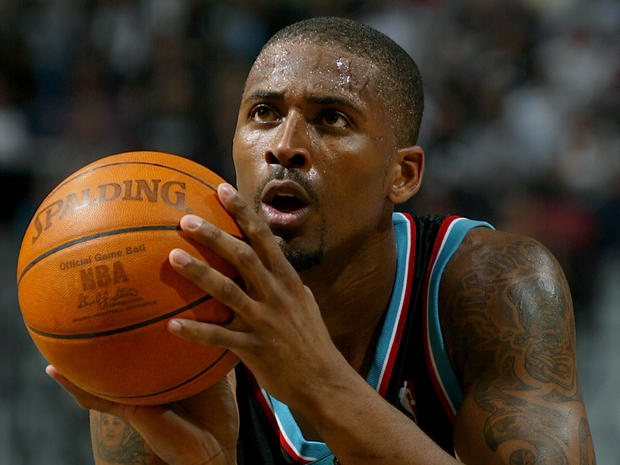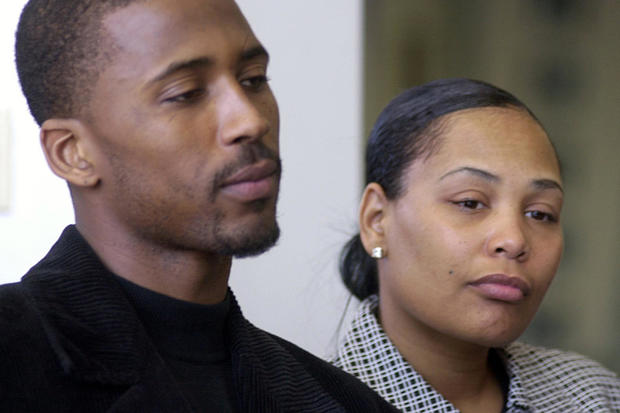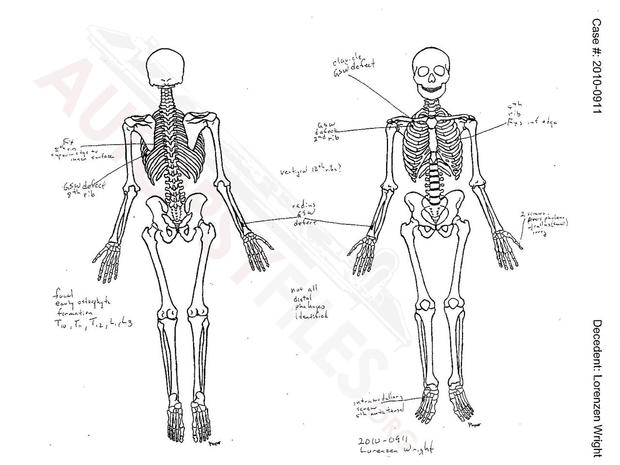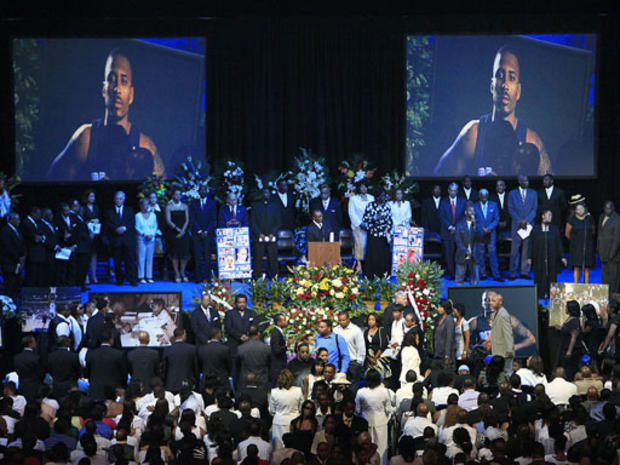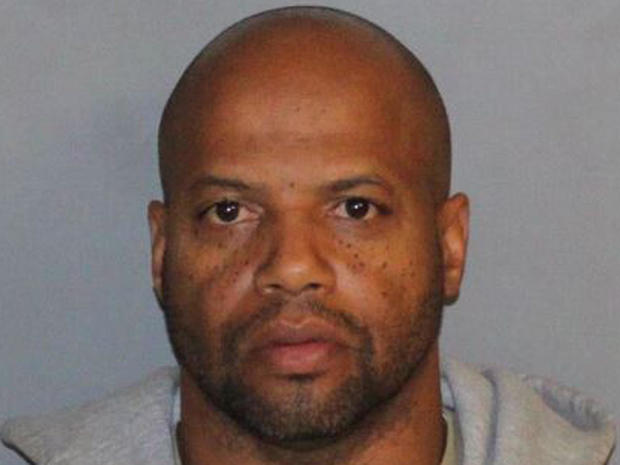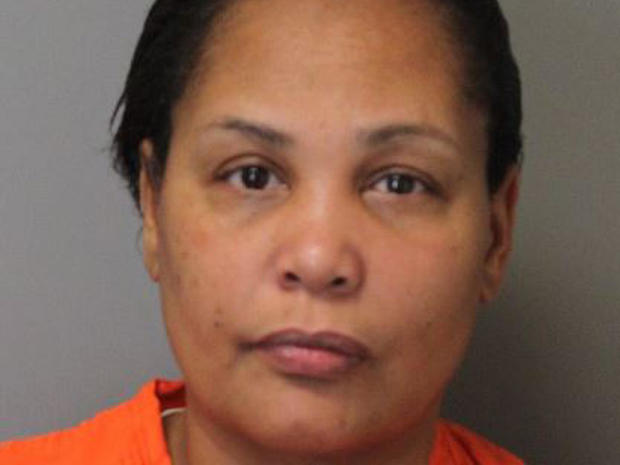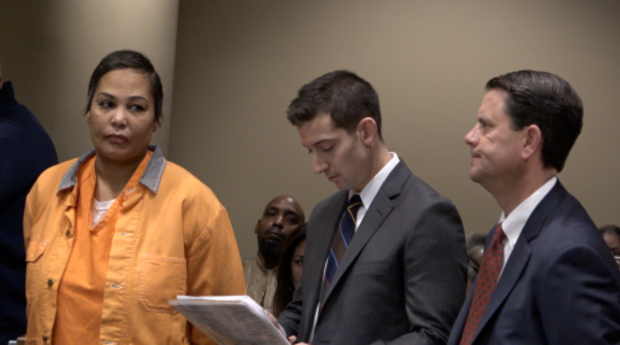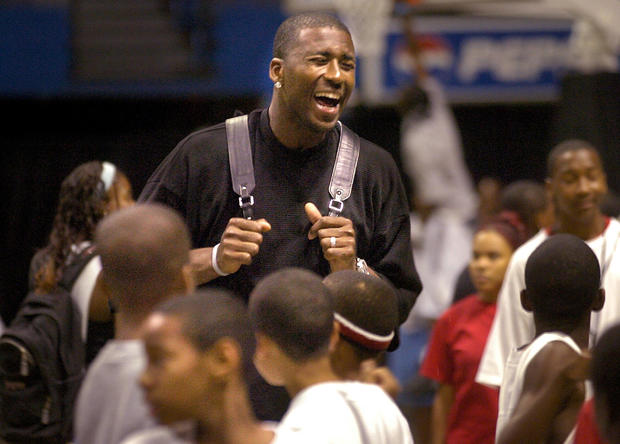Lorenzen Wright death: Surprise plea deal latest twist in the case of slain NBA star
Produced by Josh Gelman, Alvin Patrick and Jaime Hellmann
[This story first aired on May 12, 2018. It was updated on July 27, 2019.]
Lorenzen Wright made headlines as the seventh overall pick in the 1996 NBA draft – but he also won the hearts of so many because of his impact on thousands of kids who were inspired by him.
That ended in July 2010 during a call to 911. The chilling recording captured the 34-year-old's dying word: "Goddamn." A dispatcher then heard repeated gunshots – 11 in all – unaware where it was happening or who was on the other end of the line.
"You can just listen to that tape and know he was in trouble," says Toney Armstrong, former director of police at the Memphis Police Department, who oversaw the investigation. "We literally threw everything we had at this investigation. We really wanted to solve it. We really, really wanted to solve this case."
As Memphis mourned, months turned into years and the city became obsessed with solving the murder of its favorite son. Then, seven long years after the murder, police got the break they needed.
Who wanted Wright dead, and how does a beloved basketball player's life end that way? Just this week, a surprise development in one of Memphis, Tennessee's, biggest murder cases.
HOMETOWN HERO
Perched on the banks of the Mississippi River, Memphis, Tennessee, has always been a city of contrasts: famous for its place in music history and infamous for its place in the American civil rights movement.
Dr. Bill Adkins: Memphis is a city that, unfortunately, has been divided by race for many, many years.
Pastor Bill Adkins has been a long-time advocate for unity in the City of Memphis.
Dr. Bill Adkins | Lorenzen's mentor: It's a lot better than it used to be. But there are still divisions. Decisions … unfortunately, still made along racial lines.
But in a city divided, both racially and economically, there is something that brings people together.
Dr. Bill Adkins: Basketball in Memphis became -- a instrument of change … which brought races together. …You know, Memphis basketball was literally everything. And Lorenzen was a big part of that.
Once celebrated as one of Memphis' favorite sons, the memory of Lorenzen Wright still haunts this town.
James Brown | CBS News special correspondent: Put in perspective how big the Lorenzen Wright story is here in Memphis.
Marc Perrusquia: It's huge. I mean, Lorenzen Wright was a true hometown hero. He was beloved.
Marc Perrusquia has been writing for the Memphis newspaper, The Commercial Appeal, for almost 30 years.
Marc Perrusquia: We talk about big murders in the history of Memphis. You got Martin Luther King, OK, you can't trump that one, but he comes very close.
James Brown: That significant?
Marc Perrusquia: That significant.
Born in Oxford, Mississippi, Lorenzen Wright moved to Memphis to play basketball at Booker T. Washington High School. Being 6' 11" tall at 17 years old, he turned a lot of heads.
Dr. Bill Adkins: I decided to go take a look for myself.
James Brown: What did you see?
Dr. Bill Adkins: Oh, yeah, I saw this huge kid that could run the floor like a gazelle. …I mean, he could run the floor better than any big man I ever saw in my life.
Lorenzen went on to dazzle fans at the University of Memphis, but not for long.
LORENZEN WRIGHT [NEWS INTERVIEW] Thinking about what I'm going to be doing next year, whether I'm going to be at the University of Memphis or you know, in the NBA.
In 1996, he was drafted by the Los Angeles Clippers.
Dr. Bill Adkins: When he stepped up to that podium -- everybody just cheered. I mean, every -- every water hole, ever sports bar in this town had it on the TV screen. Everybody was watching. Everybody was cheering.
Lorenzen Wright spent the next 13 seasons in the NBA, playing for five different teams around the country. He reportedly earned a career total $55 million.
Wright was known for his hard work on the court, but it was his work off the court that truly endeared him to his fans at home.
Phil Dotson: He never met a fan that he didn't like. He would sign every autograph that he came across.
Perhaps no one knew Lorenzen better than Phil Dotson, Wright's best friend and fraternity brother at the University of Memphis.
Phil Dotson: He … was always a pillar in the community. Always volunteered. Always would -- would be one of the first ones to raise their hand when the team would ask for a player to go into a children's hospital, or to go and speak at a school or an event. He was just that type of guy.
Gayle Rose: He was one young man who was working to make a difference … and he symbolized hope in our community.
Philanthropist Gayle Rose is as dedicated to the city of Memphis as Lorenzen was. They were once king and queen of the Mardi Gras.
Gayle Rose: My relationship was really about our mutual interest in Memphis … and that generous big heart of his.
It was Rose's son, Max, that brought them together at a summer basketball camp.
Gayle Rose: Lorenzen took a very special liking to Max. And you know, for Max at age 11, this is a hero, a real-life hero that he gets to be in the gym with.
Gayle Rose: Lorenzen is an example to every young boy ... it doesn't matter white or black ... that if you work hard and you have the gifts, that you can … get at this level. …He loved children.
He especially loved his own. Wright was the father of seven children. He married his high school girlfriend, Sherra Robinson, after his second season in the NBA.
Her father was one of Wright's high school coaches.
Phil Dotson: Lorenzen was in high school playing … for Sherra's father… and she would come to practices. …and I believe that's how they met.
Life in the NBA can be hard on a family -- working on the road, in cities far from home for months at a time, can stress even the best of marriages.
Dr. Bill Adkins: The arguments primarily were about two things: infidelity and finances.
Phil Dotson: Being married, and having kids at such an early age … He was, I think, forced to be an adult really quick. And at the same time … in that world, not really being focused on his relationship and his marriage as probably he should've been.
In 2001, Wright signed with the Memphis Grizzlies. He was back home with his family and with money in his pocket.
Phil Dotson: He had just signed a six-year, $42 million deal at that point.
It turns out though, that more money meant more problems.
Dr. Bill Adkins: They both, unfortunately, liked to spend. And I do mean spend. …Most married couples have trouble with lack of finances. His problem was affluence and how to handle that affluence. And that caused severe issues between him and his wife.
But it was a family tragedy in 2003 that would break Lorenzen's heart and eventually his marriage for good.
Phil Dotson: His daughter Sierra passed away of sudden infant death syndrome. She was probably around 11 months old at the time of her passing, which was very hard on him.
Over the next few years, Lorenzen and Sherra separated and later divorced. Lorenzen was traded to Atlanta, which he would call home after leaving the NBA in 2009, while Sherra and the kids stayed in Memphis.
SUNDAY JULY 18, 2010
Phil Dotson: I'd gotten a phone call from him that he had gotten in town…
Lorenzen often returned to Memphis from Atlanta to spend time with his kids.
Phil Dotson: That Sunday evening we had gone to pick up his son -- Lorenzen Jr. -- from the gym. He'd had been playin' basketball that evening.
Dotson says Sherra insisted Wright bring their son home to her house that night.
Phil Dotson: And, I ended up droppin' him off that night at about 10:00 p.m. ...And when I dropped him off, he said, "Let me go in here and deal with this. And I'll give you a call later."
But Lorenzen never called his friend that night. Instead, he called for help.
THE 911 CALL
Two days after dropping off Lorenzen at his ex-wife's home, his friend, Phil Dotson got an unexpected call. It was Lorenzen's mother – looking for her son.
Phil Dotson: "Have you talked to Lorenzen? I can't reach him." And I said, "Well, I figured he might just be outta town, he's not answerin' the phone call." So-- I reached out to him as well, and didn't hear anything back.
After not hearing from her son for more than 48 hours, Deborah Marion filed a missing persons report with the police.
April Thompson, an investigative reporter at WREG, the CBS affiliate in Memphis, was on this story from the start.
April Thompson: His mother Deborah, really kind of pushed that something's not right, and made people realize that he wouldn't have been gone this long that no one heard from him.
DEBORAH MARION [WREG NEWS REPORT]: … nowhere he could be that I don't know where he is … We checked all his friends from here to Atlanta, Mississippi, everywhere. So I don't have a clue.
April Thompson: It was really kind of strange in how it happened that he had disappeared, and he was gone over all of these days, and nobody knew anything.
PIC OF LORENZEN
Most troubling for Lorenzen's family was that he seemed to have disappeared without a trace.
DEBORAH MARION [WREG NEWS REPORT] Phone goes straight to voicemail. Just rings four times and goes straight to voicemail.
But what they didn't realize at the time was that Lorenzen had actually left behind a clue. On the 911 recording are his dying words and the sound of 11 gunshots:
911 CALL: Oh, Goddamn [BANG, BANG].
911 OPERATOR: Germantown 911, where's your emergency?
911 CALL: [BANG]
911 OPERATOR: Hello?
911 CALL: [BANG, BANG]
911 OPERATOR: Hello?
911 CALL: [BANG, BANG, BANG, BANG, BANG, BANG]
That frantic call was placed at 12:05 a.m. on the morning of July 19 -- just hours after Lorenzen was dropped off at Sherra's.
The call came in to a 911 dispatcher in Germantown, Tennessee, a suburb of Memphis. But it ended before the caller could give his name and location:
911 OPERATOR: Hello?
911 OPERATOR: I don't have nothing but gunshots.
The dispatcher had trouble identifying the exact location of the call, and for reasons that are still unclear, the Germantown Police did not investigate or notify any surrounding police departments.
Lorenzen Wright had made a desperate call for help and no one knew about it.
As the days passed Lorenzen's disappearance became one of the biggest mysteries Memphis had ever seen.
Lorenzen's ex-wife, Sherra, went on the news -- appearing shaken.
SHERRA WRIGHT [WREG NEWS REPORT]: He was fine. And he's fine now. And I can't -- I'm not gonna believe anything other then he's fine now.
She said the last time she saw Lorenzen was on that Sunday night, July 18, at her home.
SHERRA WRIGHT [WREG NEWS REPORT]: He wasn't able to spend the night because he wasn't here quite that long, but he ran out and he never came back.
But a few days later when police questioned Sherra, her story had surprising new details.
Marc Perrusquia: By her account, he left with a box of drugs.
She implied that Lorenzen was involved in some sort of drug transaction and was planning to "flip something for $110,000."
Marc Perrusquia: She also told the police that there were these mysterious gunmen who were stalking him in the days before the murder.
Then, on July 28 -- 10 days after Lorenzen was last seen -- Shelby County authorities were finally told about the 911 call. Why it took that long remains a question.
That day, using more precise cell phone data and aided by cadaver dogs, the search was on.
WREG NEWS REPORT: Police in Memphis, Tennessee, have found the body of former NBA player, Lorenzen Wright…
Police find Lorenzen's body near a back woods road some 20 miles outside of Memphis.
Dr. Bill Adkins: And I turned on the television … And -- I saw Deborah, his mom -- running down the road, tryin' to get to his body … It was a total shock. It was just unbelievable that he was dead.
Gayle Rose: I literally fell off my chair and on the ground and cried.
The coroners report said he'd been hit by five bullets from two different guns: two shots to the head, two to the chest and one to his right arm. He was still wearing a watch and a chain.
Dr. Bill Adkins: …somebody just murdered him. Not for money, not robbery. Just wanted him dead.
To April Thompson, the crime seemed personal.
April Thompson: Whoever had something to do with this -- it was something deep down. …It was very emotional. It was very emotional.
Gossip started spreading and suspicion quickly fell on Sherra.
Phil Dotson: All of the arrows were pointing towards her.
Toney Armstrong served with the Memphis Police Department for 27 years and was their deputy director back then.
Toney Armstrong: When you have a murder, the persons close to them is the -- most obvious person. …In my experience workin' homicides, there's always been somebody to come to that person's defense. "You got the wrong person." "That's just not in this person's character to do this." I never got that with Sherra.
James Brown: People running to her defense maybe?
Toney Armstrong: Not to me.
Sherra had told police that Lorenzen owned a shotgun and a handgun and kept them on the property. So armed with a search warrant, they went through the house looking for the guns.
But the "weapons were not located," according to the search warrant affidavit.
A week later on August 4, Lorenzen's hometown turned out in force to say one last emotional goodbye at the FedEx Forum.
His grandmother, his father Herb, his mother Deborah, his ex-wife Sherra and their six children were dealing in their own ways with Lorenzen's death.
With the community still in shock, the city's mayor, A.C. Wharton, made this promise:
Mayor A.C.Whatron [At memorial]: We are working night and day … And that justice will be done. [applause] That's our pledge.
THE MONEY TRAIL
Despite the enormous pressure to solve the murder of Lorenzen Wright, the investigation was hampered from the very beginning.
Toney Armstrong: What was different about this particular case is that you're nine days behind.
James Brown: Nine days behind?
Toney Armstrong: Because his body wasn't found for a long time after he had initially been reported missing.
Important forensic evidence was lost due to decomposition. And the killers had a nine-day head start.
Toney Armstrong: When we first picked this case up, we inherited a cold case.
Meanwhile, in their search for possible suspects, detectives were uncovering details of Lorenzen's private life -- and it was troubling.
Even though he had reportedly earned more than $55 million during his NBA career, Lorenzen had burned through most of the money and was almost broke at the time of his death.
Marc Perrusquia | Reporter, The Commercial Appeal: They had two homes, expensive homes that were in foreclosure … Sherra … said they were bouncin' checks left and right.
Two years before the murder, Lorenzen was in need of cash and sold two of his luxury cars to a man named Bobby Cole. Cole was a drag racer, who worked the circuit, but it turns out, he also had ties to a notorious drug syndicate.
Authorities were already watching Cole when Lorenzen sold him the cars – and investigators suspected the vehicles were used to launder drug money.
Marc Perrusquia: Now, the $64,000 question about that is was Lorenzen a willing part of this? …I've been told that the connection was real tenuous. That Lorenzen didn't really know Bobby Cole. That he was introduced by a third party and it was kind of a passing relationship.
Dr. Bill Adkins: They questioned, was he doin' it for laundering money? But Lorenzen bought cars like you and I buy shirts. And --and he'd get tired of it, he'd sell it, just simply put.
The DEA ultimately found no drug connection between Lorenzen and Cole. But it cast a shadow over Lorenzen's squeaky clean image and reinforced Sherra's accusations that he was involved in a high stakes drug transaction the night he was murdered.
Dr. Bill Adkins: What troubled me the most was Lorenzen was killed twice. He was killed physically. Then his character was assassinated … People now don't think of him as that charming, happy young man who played for Memphis. Now they think of him as a drug dealer.
Despite the drug allegations against Lorenzen, many people were still suspicious of Sherra. Three months after the murder, she agreed to talk to April Thompson.
James Brown: What was that like?
April Thompson | WREG reporter: I was surprised that she agreed to the interview. …There was a lot of speculation going around that she knew something, that she had something to do with it. And I just told her, I said, "This is your opportunity to tell your side of the story."
APRIL THOMPSON: Did you have anything to do with Lorenzo's murder?
SHERRA WRIGHT: No, April. No. If I knew who did this to Lorenzen you would know who did this to Lorenzen.
April Thompson: I have heard people say that … she liked the wealth … I asked her what she was doing for money.
APRIL THOMPSON: So how are you getting by now?
SHERRA WRIGHT: I was married to an NBA basketball player for 13 years, April. My watch is a car, or my ring is a house, I mean, he was good to me.
Fourteen months after Lorenzen's death, Sherra received a million-dollar life insurance payout.
Marc Perrusquia: This $1 million insurance policy was set up for the benefit of their children. And, of course, she being the mother, wound up being the fiduciary. So that's an intriguing element to this. Did she have a financial motive in all of this, because here's a quick $1 million.
But before long, Sherra was nearly broke again -- having blown through the million dollars in just 10 months, spending most of it on expensive homes, luxury cars and extravagant trips.
Dr. Bill Adkins: When you're used to spending $40,000, $50,000 a month in just change, just spendable income and you get accustomed to that, you know, $10,000 a month seems like poverty row.
By early 2014, almost four years after the murder, Sherra had moved on and remarried.
And still, there were no arrests for the murder of Lorenzen Wright. The case grew cold
Toney Armstrong: I don't remember ever goin' more than a month without somebody askin' me about Lorenzen Wright's murder … "Have you all made any headway on it?" "Where are you on it?"
Oddly, nearly five years after Lorenzen's death, it was Sherra who drew attention back to herself by publishing a book called, "Mr. Tell Me Anything." It was about a philandering NBA player.
Marc Perresquia: When you read this book, you go, like, "Wow."
Sherra claimed it was based on her life with Lorenzen.
Marc Perresquia: The book is about a woman who has been wronged, who's very embittered, who's been abused … emotionally, has been cheated on.
And Sherra also claimed to be writing a sequel where the philandering husband in her first book is murdered.
Marc Perresquia: Sherra was very interested in getting money.
After her book was published, Sherra agreed to an interview with Kelvin Cowans -- a freelance reporter for the Tri-State Defender. It would prove to be a fateful meeting.
Kelvin Cowans: In walks this 5' 10" goddess … I just couldn't forget, you know, how I felt when I saw her; I thought she was beautiful. Her perfume was unfair, you know, and so, that's how it all started … I had never interviewed a woman and then dated her, never crossed the line.
James Brown: Never had gotten romantically involved with an interview subject?
Kelvin Cowans: Never. Not one. Sherra was the first.
Within six months she agreed to leave her marriage, leave Memphis, and move with him to Houston.
Kelvin Cowans: Houston was my idea.
James Brown: And she was up for it?
Kelvin Cowans: Absolutely. She was going through a divorce, and so she felt like it would be a new start for her and the kids as well, and I was like, "OK, let's do it."
James Brown: What was life like with Sherra?
Kelvin Cowans: It was great. Sherra was -- she's hilarious. She's funny. She's spiritual. She's a great mom. I mean, we had a great time.
Even though Cowans had heard the rumors about Sherra's involvement with Lorenzen's murder, he remained devoted to her.
Kelvin Cowans: I didn't even believe she had anything to do with it. I wouldn't never moved away with her if I thought she was guilty. You know? You have to understand she had just written a book about her life with Lorenzen, OK … and where I come from, you don't write books about people you helped to kill.
THE NEEDLE IN THE HAYSTACK
By 2016, six years after the murder of hometown hero Lorenzen Wright, Memphis had all but given up hope that the crime would be solved.
James Brown: How did this impact the city as a whole?
Marc Perrusquia: A cloud's hung over this city for some time. …the grief over, you know, losing Lorenzen. But then just this thing of, you know, why can't they catch these guys? What's goin' on?
April Thompson: A lot of people expected some kind of resolution. And it just seemed like there wasn't one.
Gayle Rose | Lorenzen's friend: Well I know at the time Toney Armstrong was their chief of police, and this was very personal to him. And he pledged that he would find the killer.
Armstrong says his department never gave up on the investigation.
Toney Armstrong: I can tell you that we threw everything but the kitchen sink at this investigation.
And it was personal. He had been meeting regularly with Wright's grieving mother, Deborah Marion.
Toney Armstrong: It was heartbreakin'. Just -- just gut-wrenching to sit across the desk and talk to her -- and to see the pain that -- that she was in.
Toney Armstrong: I wanted to be able to make that phone call to her and tell her, you know, that we found the person responsible for this. …I wanted to deliver that news to her. And we just wasn't able to at that time.
Meanwhile the relationship between Lorenzen's ex-wife Sherra and Kelvin Cowans had soured.
Kelvin Cowans: I can't say it didn't work out because she was a awful person, but there were signs of greed that I wasn't used to.
The tipping point came when Lorenzen's father Herb Wright received a $200,000 check from the NBA for his son's estate.
Kelvin Cowans: …she's telling me about it and she's asking me, "What should I do about this money? Should I go after it, should I go to court?" and I said, "No." I said, "Leave the money alone … Let them put it in the kids' trust, they can get it later. We're doing good." And she was like, "No, I don't want Herb to have it." I'm like, "It's -- nothing is going to be enough for you."
The couple left Houston and went their separate ways. Cowans came back home to Memphis and Sherra moved her kids to Riverside, California, where her brother is the pastor of a church.
Within months she was married, for a third time, to a music producer, Tim Robertson.
Back in Memphis, the rumor mill implicating Sherra Wright was still grinding away.
Marc Parrusquia: …she was at the spotlight of this whole thing as -- as, you know, kind of, you know, seemingly suspect number one.
But rumors don't equal proof, and police director Toney Armstrong's tenure had come to an end.
Toney Armstrong: I had already announced my retirement. I remember havin' a conversation with an investigator by the name of Darren Goods. …And he asked me for permission to -- to look at -- into the case. And said that he felt that he could solve it. …I knew … that he was on to something and I just prayed that he would have some success with it.
Armstrong's prayers were answered seven years after the murder of Lorenzen Wright on Nov. 9, 2017. Acting on a tip, Memphis Police went to a lake in Walnut, Mississippi. There, in the murky red clay water, they found a gun believed to be used in the killing.
James Brown: How unusual is it to find a key piece of evidence some seven years later?
Toney Armstrong: That's the needle in the haystack. They found the needle in the haystack. …and for them to be able to recover that gun is -- is a pretty remarkable feat.
Although, Kelvin Cowans had broken up with Sherra Wright, he thought she would be happy when the gun was found. But he didn't get the reaction he expected when he called her to celebrate.
Kelvin Cowans: I say, "Hey, the police have done this great thing. They found the gun that killed Lorenzen."
Kelvin Cowans: We got on the phone and she wasn't happy about it at all, and --
James Brown: Really?
Kelvin Cowans: --and that bothered me. That -- that was when I first started to believe that, you know what, maybe I haven't been looking at grief, you know, all this time. Maybe I've been looking at guilt.
After finding the gun, the case took an unexpected turn. On December 5, police arrested Billy Ray Turner in a convenience store in Collierville, Tenn.
Marc Perrusquia: It was almost like a surreal moment, really. I mean, because, you know, we kept hearin' these things about Sherra. …And then they arrest this guy Billy Turner, who nobody ever even heard of.
James Brown: Who is Billy Ray Turner and how does he fit into the case?
Toney Armstrong: If he is who this investigation says that he is -- he's a murderer. …he's a cold-hearted murderer.
Billy Ray Turner was then a 47-year-old landscaper. He took care of Sherra Wright's lawn and was also a deacon at her church.
Marc Parrusquia: A lotta people, when they talk about Billy Ray Turner, his friends and … congregants out there, they say, "Hey, no. They got the wrong guy."
But they may not have known that Turner is also an ex-convict who served time for assault and kidnapping over two decades ago.
Dr. Bill Adkins | Lorenzen's mentor: As far as Mr. Billy Ray, I have never met him, don't know him. But I do know that Sherra is quite capable of manipulating a man.
Kelvin Cowans: Sherra is the type of person where she can make you go jump off a bridge, get back up, go back up there and jump again, OK.
After Turner's arrest, Sherra and Cowans spoke by phone again.
Kelvin Cowans: …she was telling me that the media was hounding her for an exclusive about the finding of the gun and the arrest of Billy Ray Turner, and I was like, "Why don't you do it, you know. It's unnatural not for you to do it," you know, and she's like, "Well, they're just going … to twist my words." …I said, "The public wants to hear from you Sherra," you know … and she just wasn't -- she wasn't with it.
Ultimately, it wasn't up to Sherra Wright.
KCAL NEWS REPORT: Memphis police just announced Lorenzen Wright's ex-wife is now charged with murder.
Ten days after Turner's arrest, Sherra was taken into custody in Riverside, Calif.
Back in Memphis, despite all of the rumors, the news evoked mixed feelings.
Kelvin Cowans: Tough, really tough. …I just sat there.
James Brown: Thinking?
Kelvin Cowans: Just …"How could you? How could you?"
Phil Dotson | Lorenzen's friend: She was arrested and our worlds were just blown up.
Gayle Rose: …there's some part of me, to be honest with you, that doesn't want to believe that, and just can't, can't take that in.
Memphis police did not say why they arrested Sherra Wright, but seven long years after the murder of Lorenzen Wright, they finally got their suspects.
Deborah Marion [yells in court]: How could you murder my son? That's what I came to know, just how!
Toney Armstrong: The journey has led you right back to the person that was supposed to be as close to him as anybody, and that was his wife. So it's easy for somebody to say, "Well, the-- the obvious suspect was right there in front of you the whole time." …But look at it in a positive light. …you can basically say that they never gave up. …the investigators that took a part in this investigation -- should be celebrated, you know, at this point. …there's still a case to be tried in court.
THE ALLEGED PLOT TO KILL LORENZEN
WREG NEWS REPORT: The former wife of NBA star Lorenzen Wright appeared at an extradition hearing … today. Sherra Wright faces a charge of first-degree murder for his death.
After the arrest of Sherra Wright in December 2017, the Memphis court of public opinion seemed to come to its own conclusion.
James Brown: Do you think Sherra Wright killed Lorenzen Wright?
Phil Dotson: I hate to say it, but it seems like she did.
Dr. Bill Adkins: I do. … I think Lorenzen was killed for money.
Kelvin Cowans: I believe she did, and that's hard to say.
On Jan. 25, 2018, the real court of Shelby County weighed in. Sherra Wright was extradited from California to Tennessee, where she appeared in court in an orange jumpsuit, arraigned for the murder of her ex-husband.
Deborah Marion: [to reporters on Feb. 26] This is hard, but I'm glad. I've been waitin' for seven years for this.
Sherra Wright and Billy Ray Turner were charged with first-degree murder, attempted murder and conspiracy. Assistant District Attorney Paul Hagerman is one of Shelby County's best prosecutors, but he's trying to manage expectations.
Prosecutor Paul Hagerman [to reporters on Feb. 26]: Two defendants, years and years, cold case for years and years. It's challenging.
Billy Ray Turner has hired John Keith Perry Jr., an experienced defense attorney with a good record.
John Keith Perry Jr. [to reporters on March 19]: His family's a Christian family. They are steeped in faith. And they know at the -- at the end of the day -- they have the strongest belief as well as I that Mr. Turner will be exonerated at the end.
Sherra now has two court appointed attorneys: Juni Ganguli and Laurie Hall.
Wright and Turner pleaded not guilty to all charges, but the indictments revealed two startling claims. One, a previous murder attempt by Wright and Turner.
Marc Perrusquia: …supposedly, a few weeks before they actually killed him, they tried to kill him down in Atlanta. …they actually say that Billy Ray Turner was in Lorenzen's house…
And the second claim? A third person was involved -- someone who claims to have been in on it – an unindicted co-conspirator.
James Brown: Do you think that someone knows, has known, who the killer or killers were but has just held onto the information?
Marc Perrusquia: Yes, I do. …How did they find this gun in the lake? I mean, I've heard stories about that. …who knows what and how it all fits together.
Kelvin Cowans tried to put all the pieces together by writing a book about his complicated relationship with Sherra Wright.
Kelvin Cowans: No one wants to come to a realization that a mother with no criminal background, mother of seven of his children, would be involved in his murder. No one wants to believe that.
At a bond hearing in May 2018 came a stunning revelation: the prosecution identified the alleged co-conspirator. His name is Jimmie Martin, a convicted murderer currently serving time in prison. He's also Sherra Wright's cousin.
Martin claims that it was he who plotted with Billy Ray Turner and Sherra to kill Lorenzen Wright -- first in an aborted attempt in Atlanta --
Prosecutor Paul Hagerman: … that they were going to Lorenzen Wright's house in Atlanta, Georgia, to murder.
-- and then in Memphis.
Prosecutor Paul Hagerman: Or to lure him to Memphis, Tennessee, and murder him there.
Martin alleges that he was not present for the actual murder, but he did help Turner and Wright clean up the crime scene. He also claims that he went with Turner to the Mississippi lake to throw away that gun.
Prosecutor Paul Hagerman: Martin stated he accompanied Billy Turner to a lake, where Billy Turner disposed of a handgun that was used to murder Lorenzen Wright.
Prosecutors allege that Sherra and Turner had a sexual relationship and that they killed Lorenzen Wright for his million-dollar insurance policy. As Sherra left the courtroom, she and Turner exchanged a passing glance.
Prosecutors have decided not to seek the death penalty in the case, which is fine with Lorenzen's family.
April Thompson: His mother told me directly, "I have had to live with the loss of a son. And -- death would be too easy." So they don't want the death penalty. But I think they wanna know the details of what happened, you know. And all of that should come out in court.
Not seeking death could signal that the prosecution believes this case is not open and shut.
Prosecutor Paul Hagerman [to reporters]: I expect nothing but a fight.
And fight they did. But on July 25 came stunning news. Sherra Wright Robinson pleaded guilty to facilitation of first-degree murder. She received a 30-year prison sentence.
Finally, nine years after the tragic death of Lorenzen Wright, this plea offers some solace to his mother and maybe a measure of closure for the city of Memphis -- still in mourning for its favorite son.
Gayle Rose: …he was one young man who was working to make a difference in his children's lives, in other children's lives. He was a generous heart. And he symbolized hope in our community. …Now it would be a shame if, if throughout all this, that -- that we forgot that.
Dr. Bill Adkins: If Lorenzen had never made the NBA, he'd be alive and well right now. …And I want everybody to know in this city that he was a good guy, not what he was portrayed to be. But a good human being.
Billy Ray Turner's bond was set at $15 million.
Sherra Wright's bond was set at $20 million.
